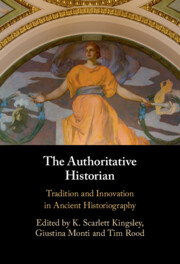Book contents
- The Authoritative Historian
- The Authoritative Historian
- Copyright page
- Dedication
- Contents
- Contributors
- Preface
- Abbreviations
- Introduction
- Part I Myth, Fiction, and the Historian’s Authority
- Part II Dislocating Authority in Herodotus’ Histories
- Part III Performing Collective and Personal Authority
- Part IV Generic Transformations
- Part V Innovation within Tradition
- Chapter 16 ‘When one assumes the ethos of writing history’
- Chapter 17 How Tradition Is Formed
- Chapter 18 Burn Baby Burn (Disco in Furneaux)
- Chapter 19 The Authority to Be Untraditional
- Bibliography
- Index Locorum
- General Index
Chapter 16 - ‘When one assumes the ethos of writing history’
Polybius’ Historiographical Neologisms
from Part V - Innovation within Tradition
Published online by Cambridge University Press: 02 December 2022
- The Authoritative Historian
- The Authoritative Historian
- Copyright page
- Dedication
- Contents
- Contributors
- Preface
- Abbreviations
- Introduction
- Part I Myth, Fiction, and the Historian’s Authority
- Part II Dislocating Authority in Herodotus’ Histories
- Part III Performing Collective and Personal Authority
- Part IV Generic Transformations
- Part V Innovation within Tradition
- Chapter 16 ‘When one assumes the ethos of writing history’
- Chapter 17 How Tradition Is Formed
- Chapter 18 Burn Baby Burn (Disco in Furneaux)
- Chapter 19 The Authority to Be Untraditional
- Bibliography
- Index Locorum
- General Index
Summary
John Marincola has defined Polybius as ‘a highly intrusive explicator’ of his own narrative.1 Polybius regularly interrupts the main narrative of events to explain and clarify what procedure he is following. Such intrusions always retain a historiographical flavour, and Polybius comes up with words or expressions used in a new way and with a new nuance, which I define as ‘historiographical neologisms’. This chapter will show how Polybius inserts himself into a tradition (which he criticizes as well) in order to establish his own authority, and will highlight two ways: borrowing and revisiting terms from other genres – the much-discussed apodeiktike historie is a famous example2 – to give them a historiographical nuance, or creating new ones.
- Type
- Chapter
- Information
- The Authoritative HistorianTradition and Innovation in Ancient Historiography, pp. 315 - 334Publisher: Cambridge University PressPrint publication year: 2023

